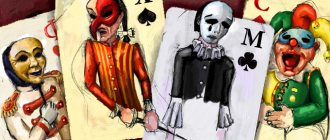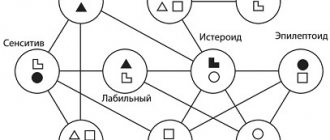Confidence in the chosen profession does not come to us immediately; it is often necessary to spend more than one hour soul-searching in order to finally find answers to the questions “who should I be?” and “where to go?” Adukar advises you to determine your type of temperament and find out how comfortable you will feel in a particular area. The choice of profession must be correct.
From birth, a person develops individual characteristics, the totality of which is called temperament. There are four types of temperament: choleric, sanguine, phlegmatic and melancholic. The answer to the question by what criteria all people are divided into these four types is very simple: everything depends on a certain ratio of such qualities of the nervous system as strength, balance and mobility.
The types of temperament are easy to understand from the example of the main characters of the cartoon “Madagascar”: Alex the lion is choleric, Marty the zebra is sanguine, Gloria the hippopotamus is phlegmatic, Melman the giraffe is melancholic
You can determine your temperament using the descriptions below. Most likely, it will be difficult to settle on one option, since people of “pure” temperament types are extremely rare, so write down two at once. The first of them will be the leading one, the second one will be the additional one.
The role of temperament in choosing a profession
When giving preference to specialties, a person must, first of all, understand what profession he is suitable for based on his temperament type. Some are happy to throw themselves into active debates, successfully negotiate even with conflicting clients, and easily resolve the issue in their favor. Others are comfortable sitting in a quiet office and working with silent equipment. There is no person who feels equally comfortable in the cockpit of a helicopter as a pilot, as a laboratory assistant in a research center, as a criminologist and as a broker on the stock exchange. Temperament sets the basis for personal development and sets priorities in choosing the type of activity. Following only profit, a person can doom himself to daily stress or unbearable boredom.
The performance of each specialist directly depends on his mood and well-being. In a state of constant stress, no employee will be able to perform their duties efficiently. Everything that is unnatural for an individual will greatly harm his mental state, even causing harm to health associated with nervous disorders.
Additional Information. Psychological pressure and shock can cause significant harm to a person’s health, just like unbearable melancholy and a constant feeling of unfulfillment.
It is important to take into account character traits such as:
- attitude towards people
- attitude towards things.
The same person can be harsh and intolerant towards others, but at the same time extremely thrifty and diligent in relation to things. The opposite combination of traits in one personality is often found: tact and kindness towards people, and carelessness and inattention towards things. Such paradoxical, at first glance, fusions of traits are the basis of temperaments. They will be the main criteria that you should pay attention to when analyzing your own character. The French writer of the 19th century, V. Hugo, wrote about human character this way: “A person has three characters: the first is what he ascribes to himself, the second is assigned to him by those around him, the third is the one that actually exists.”
Understand themselves
This statement by the French classic suggests that not everyone can understand the components of their personality, the foundations of their character. People often confuse dreams and real desires, illusions and needs. There are many popular tests that help you understand your temperament type, the results of which may surprise the test subject. Before you start looking for a job, it is worth taking several different tests to understand the main characteristics of your personality.
Work for different types of temperament
Types of human temperament and their brief characteristics
The described four main temperaments, into which all of humanity can be divided, have their own ideal professions that will maintain psychological balance and become the key to high performance and emotional balance.
Temperaments
Phlegmatic person
Phlegmatic people are people who have a constant mood. When making decisions, they are balanced, reasonable, and do not allow risky actions. Hippocrates considered such people to have high intelligence and reliable memory. They find it difficult to switch from one activity to another in a short period of time. Such people are self-possessed, calm, sometimes lazy and indifferent.
Professions for phlegmatic people should not be associated with risk, speed of reaction, or resolution of conflict situations. Anything related to algorithms, rules and laws will suit them. They are meticulous, without omitting details and without neglecting obligations, and are able to monotonously perform their functions. A suitable job for a phlegmatic person would be:
- Engineering, both computer and industrial. A person with this type of character will not get bored of sitting in an office inventing new mechanisms. With enviable consistency, he will design new information systems, debug algorithms, and test processes.
- Laboratory diagnostics. Working with analyzed samples, systematizing the results obtained, storing data, complying with safety standards - all this requires perseverance and close attention.
- Agricultural direction. Only a phlegmatic person can wisely spend time on germinating crops, competently planting them in the soil, while simultaneously taking into account the individual characteristics of plants in terms of soil acidity, germination temperature and the threat of pests.
- Accounting. Timely reporting, attention to detail, impeccable calculations - girls with this type of temperament manage to make a successful career in accounting.
Choleric
People of this type are emotionally active. In a conversation with them, you can note pronounced facial expressions, articulation, and gestures. Representatives of this temperament are able to change their mood dramatically, they are quick in their decisions, can be aggressive, and are also intolerant of others and get down to business with all passion.
Attention! Choleric people need to be especially carefully brought up from early childhood, directing emotionality and activity in a peaceful direction. Otherwise, in adult life such a person will be unable to control his emotions in difficult situations, showing aggression.
There is no place for routine in work for a choleric person. He should not be bored; monotony is contraindicated. Among the areas suitable for this type of character, the following list can be distinguished:
- Journalism. Correspondents are always on the run, they obtain exclusive information, are not afraid to make contact with new people, and do not sit still. The courage of choleric people helps them to conduct live broadcasts well, not be afraid of public speaking and get into the very center of events.
- Art. Artistry and relaxedness are necessary qualities for any theater and film actor. You can express your entire stock of emotions on stage, enthusiastically dedicating yourself to your work.
- Businessman. Organizing your own business requires entrepreneurship, quick emotional recovery from stress, and the ability to make responsible decisions in difficult situations. Business is always a risk that choleric people are not afraid of.
- Aviation. There is no room for doubt in this area. A confident, courageous pilot, capable of not getting confused in an emergency situation - a typical choleric man.
- Management and management. If advertising is the engine of trade, then choleric is the engine of people, ideas and advertising itself.
PR manager
Melancholic
Melancholic people are very susceptible to surrounding circumstances. They are easily hurt by a careless statement, and they tend to often be in a depressed state. The meaning of this type of character is close to deep emotional experiences. Melancholic people care about the opinions of others; they seek empathy among people close to them and significant to them. Emotional vulnerability will not allow the owner of this temperament to successfully work as a politician, entrepreneur or journalist.
While receiving education at school, it is difficult for a representative of this temperament to survive a bad grade; in class, being called to the blackboard causes fear and anxiety, even if the student knows the material. Notes often contain patterns and other images in the margins - this is how melancholic people express their sensuality on paper during lectures. Guys with this character often stay separate from male groups, do not go to public institutions with them, and after classes usually seek to retire to themselves.
In what profession are melancholic people comfortable, are they suitable for working in a team, what should you pay attention to in organizing the workplace:
- Archivist. The work does not involve daily stress, it is monotonous and calm. Where any choleric person would go crazy with boredom, there is a paradise for the melancholic. He will establish ideal order in document management and will meticulously maintain it. This is one of the most suitable professions for melancholic women.
- Writer. A melancholic person can pour out the whole storm of emotions onto paper. Introverted girls write emotional novels, investing all their sensuality. A lot of talented people with this difficult temperament achieved popularity by finding use for their sensitive nature.
- Composer. If you have an ear for music and education, you can go into creativity, creating musical masterpieces. World famous P.I. Tchaikovsky was a melancholic man who channeled his subtle perception of the world into music, thereby immortalizing himself for many generations to come.
- Zoo worker. A caring melancholic person is perfect for working with animals. He will notice the slightest changes in the behavior of his charges and take timely measures.
- Computer's operator. Digitizing data, systematizing information, compiling array storage, making backup copies - all this is within the power of introverted men. They are able to concentrate on unemotional work, doing their job conscientiously.
- Artist. The subtle sensitive nature of melancholic people becomes an impetus for the development of creative abilities. Some write poetry, others write paintings. Splashing out your vision of the world with paint on canvas is not only a way to make money, but also to ease your mental burden.
Artist
Additional Information. When hiring a new employee, the employer should remember which of the available professions would suit a melancholic person. You should not be afraid of sensitive and vulnerable specialists. They have well-developed intuition, they notice details better than others, this can be useful in the workplace.
Sanguine
Representatives of this temperament are people who are emotionally alive, active, and often have a positive attitude. In a stressful situation, a sanguine person would rather laugh at himself and the circumstances than, like a melancholic person, suffer due to failure and losses. Sociability is a strong point for people with this temperament. Listen, give a worthy answer, do not get confused in a complex dialogue - he manages all this with ease. For a typical sanguine person, work should be a way to realize the abilities of an extrovert. While studying at a university, young men with this type of character often become leaders of youth associations, participate in KVN tournaments, and are popular in the class with both girls and teachers.
Professions for a choleric person may be suitable for a sanguine person, since both of these types are very active and are not afraid of change and difficulties. In contrast, a sanguine person does not go on an aggressive offensive if he cannot influence the outcome of events. He will not dwell on failure and will move on, easily switching to something new.
Professions popular for sanguine people:
- Teacher. A sense of humor, lightness of character, sociability are qualities that most teachers often lack. Sanguine teachers are able to convey information to students in an easy way, do not turn the lesson into a monotonous presentation, and know how to interest the masses. Such teachers are highly popular, keep up with progress and know how to find a common language with young people.
- TV presenter. The viewer needs positivity, which is easily carried by the owner of this temperament. Just like a radio presenter, he must be able to cheerfully get out when the equipment suddenly fails, an incident occurs on the air, or teletext disappears. Resourcefulness and confident composure keep the audience in front of such a presenter.
- Leader of various trainings. A sanguine person can interest a group of people and captivate them with his movement.
Sanguine at work
Sanguine
Strong, balanced, agile type. Lively and inquisitive, flexible and dynamic, a sanguine person is not used to accumulating grievances and experiencing failures for a long time. He does not lose heart and always looks for a way out of the current situation. Active and sociable sanguine people love new experiences, they are friendly, friendly and easily get along with people.
“+”: journalist, waiter, economist, lawyer, teacher and a number of other professions for which communication skills and leadership ability are important. It is believed that of all four types, the sanguine person is the most versatile; many professions are suitable for him.
“-”: dispatcher, jeweler and other professions where there is no constant change of activity.
Is it possible to choose a profession based on temperament?
Positive character traits of a person - what applies to them
In the modern world, people rarely rely on their personal qualities when choosing a profession. The main criteria that become decisive at the time of decision-making:
- wage;
- distance from home;
- duration of vacation.
Almost no applicant thinks about how temperament and profession are connected. Only after some time can a new employee evaluate the correctness of his choice. The human qualities inherent in everyone from birth influence the formation of personality, the development of strengths and weaknesses of character, and define life values.
The role of temperament in one’s chosen professional activity cannot be underestimated. A job that causes moral torment can ruin your entire life. Therefore, the ideal job is one that meets all the requirements:
- matches the applicant’s temperament;
- highly paid;
- located within walking distance from the house;
- interesting to the specialist himself.
If you need to make a choice among these four criteria, the least sacrifice may be distance from home. It is better to use transport than to suffer for the rest of your life from the inadequacy of your occupation.
Test
Every employer should remember the influence of temperament on the choice of profession. When recruiting staff, it is imperative to conduct a small but useful test to determine a person’s innate abilities. A person with a phlegmatic character should not be allowed to occupy a position suitable for a choleric person. No matter how talented a specialist may be, innate personality traits will interfere if the type of activity runs counter to one’s temperament.
Phlegmatic person
Weak, balanced, inert type. Restrained and imperturbable phlegmatic people are difficult to anger; they are not at all prone to conflicts. These are calm and patient people who do not tend to clearly express their mental states outwardly. Phlegmatic people find it difficult to integrate into a new environment; they experience stress from the need to constantly jump from one thing to another. Representatives of this type like to work carefully and leisurely.
“+”: engineer, doctor, accountant, laboratory assistant, agronomist, statistician, system administrator and other professions that require cold-blooded analysis and the ability to make decisions.
“-”: show host, secretary and other professions without a clear schedule, where you have to deal with unforeseen situations and improvise.






